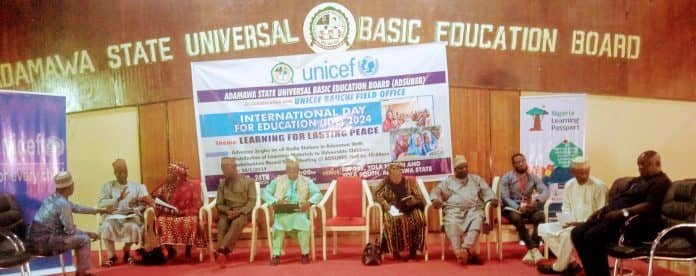From Umar Dankano,Yola.
The Federal and state governments have been urged to enhance safe and quality learning standards in all schools across the country.
Critical stakeholders in education made the position known at a stake holders round table meeting held in Yola, Adamawa state capital Wednesday as part of activity in commemoration of International Day for Education, IDE. for 2024.
During the round table meeting organised by the United Nations Children’s Funds (UNICEF) issues observed to be addressed for safe learning include inadequate number of teachers, non attendance of classes by some teachers, non-completion of school syllabus, closure of some schools as a result of disasters, and use of school facilities for non-school activities.
Others challenges raised affecting the education are ; absence of perimeter walls in a number of schools, dearth of infrastructure and logistics, insufficient funding and monitoring and the existence of unqualified teachers in some instances.
It was unanimously agreed that, there is need for the governments and other stakeholders to enhance funding for the sector, ensure sturdy surveillance, and weed out unprofessional and unqualified teachers.
Earlier in his submission, the commissioner of Education, Dr. Umar Garba Pella said the state government has been doing it’s best by providing infrastructure for the over 8000 schools in the state.
Represented by the Director, Human capital development of the Ministry, Mohammed Nasidi.Pella added that the government is building more blocks of class rooms and instructional materials are being provided as well as sponsoring teachers on training and retraining courses.
He also acknowledged and appreciated the contributions from development partners including UNICEF for their numerous support (s) appealing for more.
In his goodwill speech, UNICEF Chief of Field Office, Bauchi, Dr. Tushar Rane noted that the roundtable discussion was convened to deliberate on learning crisis in the state and how to mitigate identified challenges to deliver quality education and strengthens governance systems.
Rane noted that the theme of this year’s IDE “learning for lasting peace” was deliberate considering the global surge of violent conflicts and it’s concomitant impact on safety and sustainability of learning.
“In northern Nigeria, there were 499 schools closures due to floods, fear of attacks, or occupation by state/non-state actors in 2022 – 26 of these schools were in Adamawa state.
“According to the 2022 Humanitarian Needs Overview, conflict in the Borno, Adamawa, and Yobe states has left approximately 1,400 schools damaged, many of which remain unrehabilitated or without sufficient learning materials.
“Unsafe school environment is a catalyst for children staying out of school. One in three children Nigeria is out of school (10.2 million at the primary school level and 8.1 million children at the junior secondary level). 3 in 4 children cannot read nor solve a simple mathematics problem. This portends huge socio-economic risks for the country, if not checked,” he said.
While delivering a paper on the crisis of education in Adamawa State, Abdurrahman Ibrahim Ado, Education Specialist with UNICEF Bauchi Field Office noted that for various reasons, 1.4 million children are out of school in the Borno, Adamawa and Yobe States.
He added that the condition of education delivery especially around the North East has become so bad that 72 percent of pupils cannot read simple text after completing primary six.
Ado Highlighted some of the interventions of UNICEF to mitigate the situation, stressing that,UNICEF has aided technical support to national plans, state-level safe steering committees and training as well as state-level implementation planning committees, among others.
The event attracted government officials, civil society groups, officials of UNICEF as well as students from different schools who deliberated on lear

